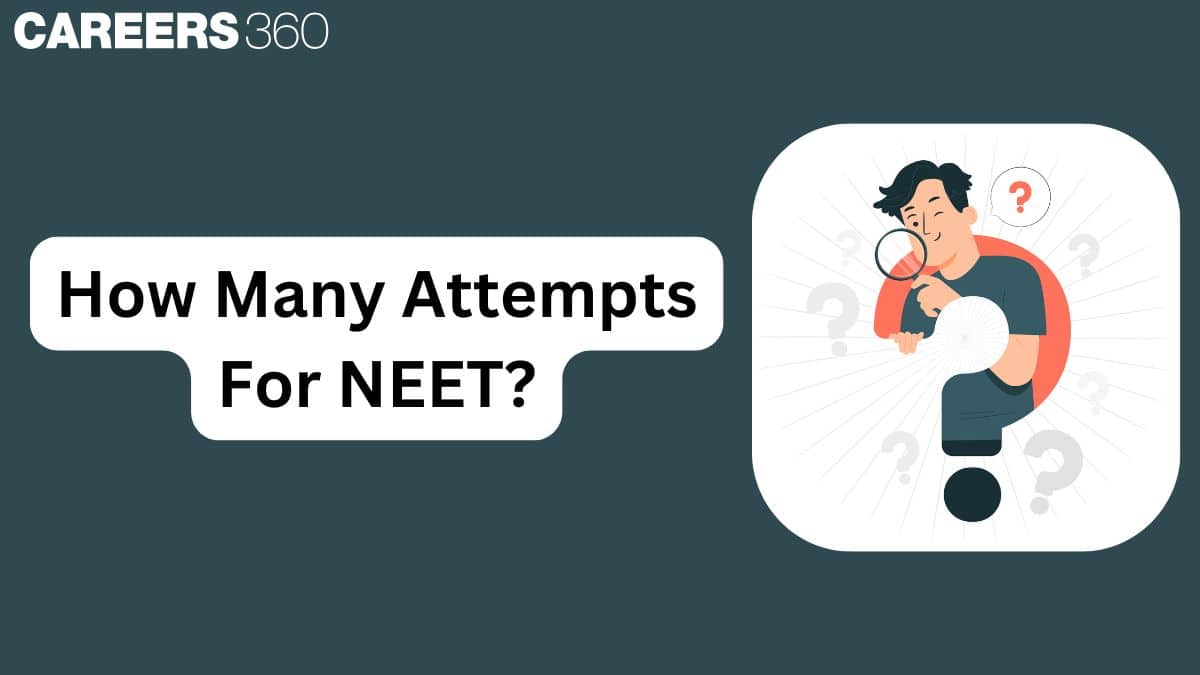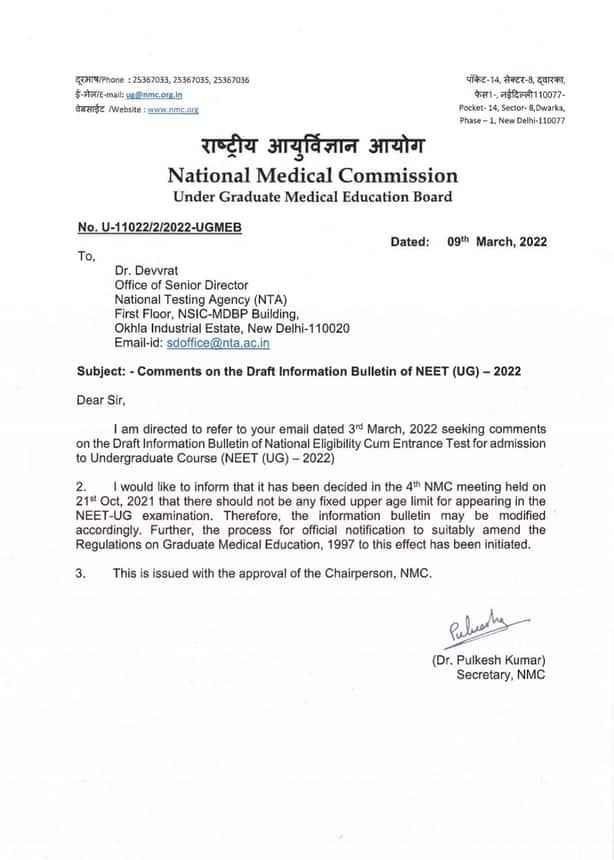Virohan Allied & Healthcare Programs
Allied & Healthcare programs | 20+ Partner Universities & Institutes | 98% placement record
The National Eligibility cum Entrance Test (NEET) is the single largest entrance examination in the medical domain. Through NEET UG, admissions are granted to medical and dental colleges across India. However, there remains confusion regarding the age limit and the NEET exam attempt limit. It has always been a major doubt amongst the aspirants. Every year, lakhs of aspirants register for NEET; however, they are often confused about the NEET UG age and attempt limit.
This Story also Contains

Candidates should know that there are no restrictions on the NEET attempts and the maximum age limit for NEET. The NMC removed the restriction for NEET UG exam on the age and number of attempts. However, as per the NEET age limit, candidates should be above 17 years old to be eligible to fill out the NEET application form. Know more about the NEET 2026 number of attempts and age limit before applying for the entrance test from the article below.
There is no limit to the number of attempts in the NEET exam. The committee has also proposed to restrict the number of attempts in the NEET 2026 exam. NEET exam is a single national-level entrance examination which is conducted by the National Testing Agency (NTA) for admissions to over one lakh MBBS, 27,868 BDS, 52,720 AYUSH courses (BHMS, BAMS, BUMS), and 525 BVSc & AH courses in colleges across the country. Admission to BSc nursing courses in many universities is also granted based on NEET result. As per the paper pattern of NEET, a total of 200 multiple-choice questions are asked, and candidates will have to answer only 180 MCQs.
Allied & Healthcare programs | 20+ Partner Universities & Institutes | 98% placement record
There is no certainty on whether there will be an attempt limit in NEET 2026. The NEET UG attempt limit is set by the NTA, and as per the current update, candidates can appear as many times as they want. Such candidates need to fulfil the NEET eligibility criteria.
The NTA has set a certain age limit for the NEET UG exam. Where there is no restriction on the upper age limit, the NTA has implemented a lower age limit for the NEET UG exam.
Aspirants should have reached the age of 17 by the time of admission or attain this age on or before December 31 of the same year they are seeking admission.
Earlier, the medical aspirant had a cap of 25 years to be eligible for the NEET UG exam. Candidates belonging to the SC/ ST/ OBC and other reserved categories were given a relaxation of 5 years. However, at present, there is no upper age limit. Any student who is 17 years old can take the NEET exam along with no limit on the number of attempts.
NEET exam attempt limit refers to the number of times a candidate can appear for the NEET UG exam. As per the NTA (National Testing Agency), there is no restriction on the number of attempts for the NEET exam. Candidates can apply for the NEET exam as many times as they want.
2022
With an official notification, the National Medical Commission announced that the upper age limit for NEET UG has been removed. The decision on the NEET upper age limit has been taken in the 4th NMC meeting held on October 21, 2021; however, announced on March 9, 2022. The official notice released by the NMC can be checked below.

2019
The ineligibility of NIOS/ open school students for NEET UG was another major controversy that arose in 2019. While they were allowed to appear for NTA NEET until 2017, the Medical Council of India (MCI) decided to bar them from appearing in NEET from 2018 onwards. The clause was later revoked, and open school students were allowed to appear for the exam.
The other controversy was in regard to the question of Biology as an additional subject. Students who had studied Biology as an additional subject in Class 11 and 12 were considered ineligible. This clause was also revoked, and such students were allowed to take the exam in 2019.
2018
The MCI's decision to reintroduce a NEET upper age limit was first revealed via a Gazette of India notification published on January 23, 2018. The introduction of these rules led to tremendous controversy and an uproar among NEET aspirants. Within a week of introducing the NEET attempt limit rule, MCI scrapped it.
For candidates, there is no fixed number of attempts for NEET anymore, and this was to be determined by the upper age limit criterion. However, the minimum age limit for medical students to appear in NEET must be 17 years or above.
2017
CBSE, in 2017, presented an upper age cap along with a maximum attempts limit with a notification that mentions “the number of attempts which a candidate can avail at NEET-UG examination shall be limited to 3 (three) uniformly to all the candidates. The previous attempts in AIPMT/NEET will be counted against these 3 permissible attempts. Candidates who have already exhausted their allowed 3 attempts are not eligible to apply for NEET (UG) 2017”.
CBSE also set an upper NEET exam age limit for unreserved candidates at 25 years and reserved candidates at 30 years, stating that “the upper age limit for NEET-UG is 25 years as on the date of examination with relaxation of 5 years for the candidates belonging to SC/ST/OBC category”. This rule was overruled by the Supreme Court in the same year. The clause on NEET age limit and attempts was then reintroduced again in 2018 with a twist.
Frequently Asked Questions (FAQs)
There is no limit to the number of attempts for NEET exam.
You can appear for NEET as many times as you wish, provided you meet the eligibility criteria.
As stated, there is no longer limit on attempts in NEET. Candidates should just ensure they fulfil the NEET eligibility criteria.
There is no upper age limit for NEET 2026. You can appear for the examination.
Yes. NIOS students are eligible to appear for NEET 2026 unless notified otherwise.
The minimum basic qualification required to appear in NEET is a 10+2 or equivalent examination with Physics, Chemistry, Biology/Biotechnology and English as core subjects. Candidates must have passed this exam from a recognized board with a minimum of 50% marks in the PCB group for the general category, 40% for SC/ST/OBC, and 45% for PwD candidates. Additionally, candidates must be at least 17 years old by December 31 of the admission year.
On Question asked by student community
Yes, it is an entrance exam. Please register at http://www.upvetuniv.edu.in/ .
Prospectus can be found at https://upvetuniv.edu.in/wp-content/uploads/2026/02/Prospectus-2026-27Final.pdf
You can check the NEET PYQs by Careers360 for previosu years' question papers.
Yes, You can change the date of birth in the NEET registration correction window.
To know what are the details can be corrected in the submitted NEET application form, Click here .
Yes — you can sit for NEET (National Eligibility cum Entrance Test) even if you took the Commerce stream in school, provided you meet the eligibility criteria set by the National Medical Commission (NMC) and your state/university. Key points and steps:
Eligibility criteria (core requirements)
Academic subjects: You must have
If your father’s name appears differently in your Class 10 marksheet compared to other documents, you should not upload an affidavit during the initial
NEET
application unless the form specifically asks for it.
Fill the application using the name that matches your Aadhaar and other main IDs, and prepare a
Allied & Healthcare programs | 20+ Partner Universities & Institutes | 98% placement record
Amongst top 3% universities globally (QS Rankings) | Wide Range of scholarships available
Ranked #19 by NIRF, NAAC A++ Accredited | Recognized by dental council of India
Ranked #18 by NIRF, NAAC A++ Accredited | Unmatched clinical exposure with over 7 lakh patients yearly